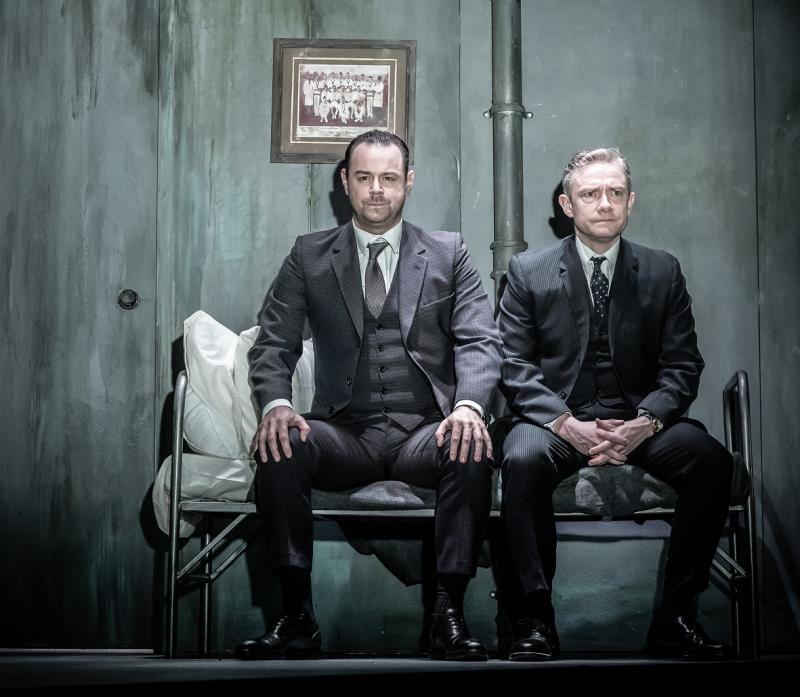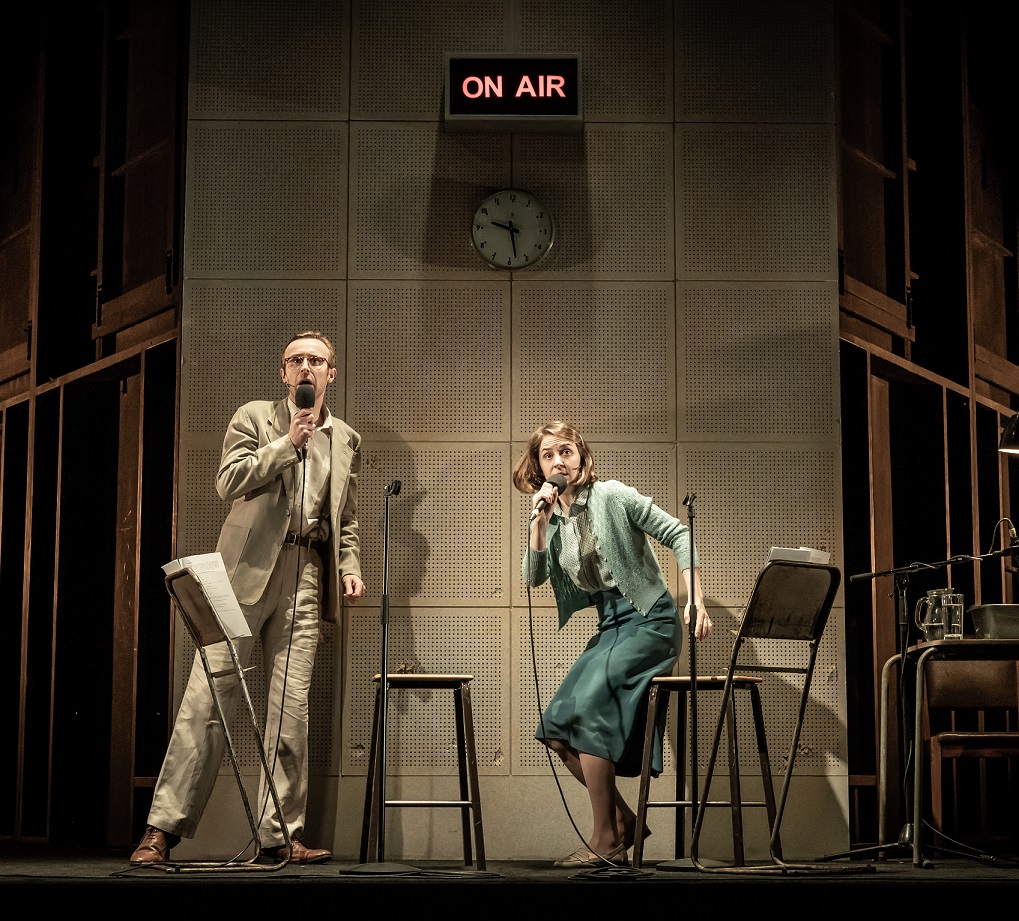Pinter Seven, Harold Pinter Theatre review - elaborations of anxiety | reviews, news & interviews
Pinter Seven, Harold Pinter Theatre review - elaborations of anxiety
Pinter Seven, Harold Pinter Theatre review - elaborations of anxiety
The season's closing pairing presents Danny Dyer and a radio revelation

It was back to the very beginning for this final instalment of “Pinter at the Pinter”, with its pairing of A Slight Ache and The Dumb Waiter.
This highly revealing commemorative season of the playwright’s one-act plays has shown what (relative) rediscoveries there are to be made. A Slight Ache, originally written in 1959 as a radio play, remains much less known than The Dumb Waiter; written in 1957, which reached the London stage three years later and is now among the signature early Pinter works. The casting here of Danny Dyer, himself something of a protégé of the dramatist, and Martin Freeman, certainly makes it the centre of advance attention on Jamie Lloyd’s double-bill, arguably even of the season as a whole.
But it's A Slight Ache that proves the revelation of the evening. Lloyd’s production cleverly plays on its radio origins, his cast (John Heffernan, Gemma Whelan) located in a studio, complete with clutched microphones and illuminated “On Air” sign, but each moves in and out of that defined setting as their solo developments demand (Whelan doubles it all with ingeniously providing studio sound effects, a lovely touch).
Language is made strange, sparklingly so, with the staccatos attached to choice words
It plays around the Pinter trope of outsiders occupying apparently secure spaces – here, the smug House and Gardens-style apparent idyll of Flora and Edward’s home and marriage – and destroying them from within. The nominal interloper is an aged, dishevelled match-seller, and class was at the fore, his silence all the more threatening against the cut-glass, RP accents of the couple; how keenly Pinter captures their self-satisfied primness, equalled only by its latent capacity for self-destruction. But, of course, this being radio, and a two-hander to boot, there is no literal impostor (some theatrical stagings have provided a physical presence), so the attacks are subliminal. Most desperately so in Whelan’s case, where a whole life story of sexual repression is challenged, the cadence of her line, “Speak to me of love”, cutting through with practically Lawrentian primality.
How much “Pinter at the Pinter” has taught us about the dramatist’s uncanny ability to premeditate history. He was writing A Slight Ache only three years after Suez, but it certainly chimes with current Brexit issues, reasserting as they do those same national questions of “place in the world” that Pinter isolates in microcosm. Was I the only one to detect a chord of Rees-Mogg in Edward’s snobbish, over-educated arcanity? Yet Edward gets some of the most glorious lists in the Pinter canon (he reels off a choice of drinks with indecent luxuriance). Likewise the sinister inflections attached to the names of various garden plants: language is made strange, sparklingly so, with the staccatos attached to choice words like “hassock” or “stripling”; there's a whole absurdist, pre-Python universe there in “solo whist”. (Pictured below: John Heffernan, Gemma Whelan) Which, surprisingly, makes The Dumb Waiter somewhat pale in comparison, though the verbal epiphanies are there: where else does “bean sprout” evoke the astonishment of a moon landing, or “deficient ballcock” acquire the certainty of criminal conviction? But Dyer’s Ben and Freeman’s Gus didn’t quite sustain it in their long semantic sequence about how you engage with a kettle. The recurring reductio ad absurdum, as in the recycled newspaper headlines, was sometimes perfect, but elsewhere something – the exactly right kind of brio, perhaps – felt missing. When it doesn’t quite come together, Ben’s line, “When are you going to stop jabbering?”, acquires a different emphasis.
Which, surprisingly, makes The Dumb Waiter somewhat pale in comparison, though the verbal epiphanies are there: where else does “bean sprout” evoke the astonishment of a moon landing, or “deficient ballcock” acquire the certainty of criminal conviction? But Dyer’s Ben and Freeman’s Gus didn’t quite sustain it in their long semantic sequence about how you engage with a kettle. The recurring reductio ad absurdum, as in the recycled newspaper headlines, was sometimes perfect, but elsewhere something – the exactly right kind of brio, perhaps – felt missing. When it doesn’t quite come together, Ben’s line, “When are you going to stop jabbering?”, acquires a different emphasis.
The physical movement was right, though, Freeman stretching, almost militarily, at the beginning as he limbered up, set against Dyer’s preening apathy of bodily texture, their odd-couple double act slotting in historically somewhere between Stan and Ollie and Tarantino’s later, similarly black-suited shooters. If the laughter of A Slight Ache is occasionally revelatory, even expansive, here it falls between relieved and somehow inappropriate, that enclosed quality caught in Soutra Gilmour’s set, its defining action coming from the slamming of the titular object. It may seem ironic when Ben talks of liking a “look at the scenery” when this nefarious duo sets off on a jaunt, but what vistas Pinter discovers in these enclosed, desolate territories of anxiety that he charted. “Pinter at the Pinter” has reminded us, brilliantly, of the richness of his brevity.
- Pinter Seven at the Harold Pinter Theatre to February 23
- Read more theatre reviews on theartsdesk
rating
Explore topics
Share this article
The future of Arts Journalism
You can stop theartsdesk.com closing!
We urgently need financing to survive. Our fundraising drive has thus far raised £49,000 but we need to reach £100,000 or we will be forced to close. Please contribute here: https://gofund.me/c3f6033d
And if you can forward this information to anyone who might assist, we’d be grateful.

Subscribe to theartsdesk.com
Thank you for continuing to read our work on theartsdesk.com. For unlimited access to every article in its entirety, including our archive of more than 15,000 pieces, we're asking for £5 per month or £40 per year. We feel it's a very good deal, and hope you do too.
To take a subscription now simply click here.
And if you're looking for that extra gift for a friend or family member, why not treat them to a theartsdesk.com gift subscription?
more Theatre
 Hamlet, National Theatre review - turning tragedy to comedy is no joke
Hiran Abeyeskera’s childlike prince falls flat in a mixed production
Hamlet, National Theatre review - turning tragedy to comedy is no joke
Hiran Abeyeskera’s childlike prince falls flat in a mixed production
 Rohtko, Barbican review - postmodern meditation on fake and authentic art is less than the sum of its parts
Łukasz Twarkowski's production dazzles without illuminating
Rohtko, Barbican review - postmodern meditation on fake and authentic art is less than the sum of its parts
Łukasz Twarkowski's production dazzles without illuminating
 Lee, Park Theatre review - Lee Krasner looks back on her life as an artist
Informative and interesting, the play's format limits its potential
Lee, Park Theatre review - Lee Krasner looks back on her life as an artist
Informative and interesting, the play's format limits its potential
 Measure for Measure, RSC, Stratford review - 'problem play' has no problem with relevance
Shakespeare, in this adaptation, is at his most perceptive
Measure for Measure, RSC, Stratford review - 'problem play' has no problem with relevance
Shakespeare, in this adaptation, is at his most perceptive
 The Importance of Being Earnest, Noël Coward Theatre review - dazzling and delightful queer fest
West End transfer of National Theatre hit stars Stephen Fry and Olly Alexander
The Importance of Being Earnest, Noël Coward Theatre review - dazzling and delightful queer fest
West End transfer of National Theatre hit stars Stephen Fry and Olly Alexander
 Get Down Tonight, Charing Cross Theatre review - glitz and hits from the 70s
If you love the songs of KC and the Sunshine Band, Please Do Go!
Get Down Tonight, Charing Cross Theatre review - glitz and hits from the 70s
If you love the songs of KC and the Sunshine Band, Please Do Go!
 Punch, Apollo Theatre review - powerful play about the strength of redemption
James Graham's play transfixes the audience at every stage
Punch, Apollo Theatre review - powerful play about the strength of redemption
James Graham's play transfixes the audience at every stage
 The Billionaire Inside Your Head, Hampstead Theatre review - a map of a man with OCD
Will Lord's promising debut burdens a fine cast with too much dialogue
The Billionaire Inside Your Head, Hampstead Theatre review - a map of a man with OCD
Will Lord's promising debut burdens a fine cast with too much dialogue
 50 First Dates: The Musical, The Other Palace review - romcom turned musical
Date movie about repeating dates inspires date musical
50 First Dates: The Musical, The Other Palace review - romcom turned musical
Date movie about repeating dates inspires date musical
 Bacchae, National Theatre review - cheeky, uneven version of Euripides' tragedy
Indhu Rubasingham's tenure gets off to a bold, comic start
Bacchae, National Theatre review - cheeky, uneven version of Euripides' tragedy
Indhu Rubasingham's tenure gets off to a bold, comic start

Add comment